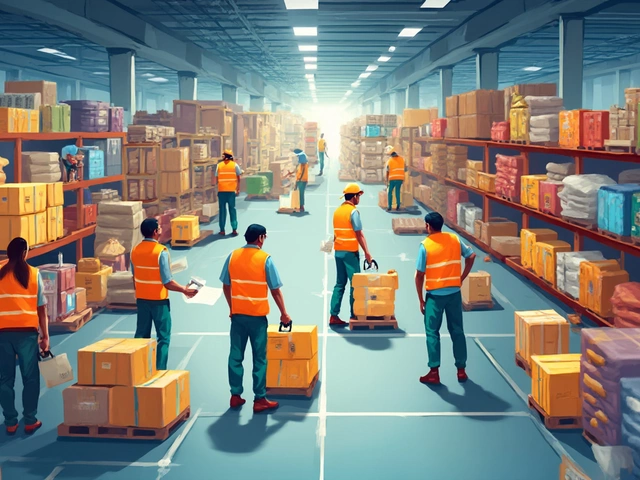No matter how much tech takes over, logistics keeps the world moving. The stuff you order online? Logistics folks make sure it gets from the warehouse shelf to your front door—sometimes in a single day.
So what does it actually take to work in this fast-moving field? It's not all about driving forklifts or packing boxes. Companies these days look for people who can problem-solve when a truck gets stuck in traffic, or when an order suddenly jumps from 10 to 1,000 units overnight.
Communication is huge. Imagine trying to juggle sudden changes, talk with drivers at 2 a.m., and keep customers calm while tracking a shipment that just disappeared from the system. If you can keep your cool and think on your feet, that's a massive advantage.
Sticking to strict schedules is part of the game, but being flexible when everything goes sideways—that's what makes great logistics workers stand out. If you’re organized, like solving real-world puzzles, and don’t mind a bit of pressure, you’re already ahead of most folks looking to break into logistics.
- Core Skills You’ll Need
- Getting the Right Qualifications
- Tech Know-How in Modern Logistics
- Tips to Break into the Industry
Core Skills You’ll Need
There’s a common myth that you just need to be strong or good at lifting to work in logistics. That’s outdated thinking. Logistics jobs call for brains and a cool head more than anything. Your day might have you hopping between calls, tracking orders, checking inventory, and solving problems on the fly. Multitasking is not just nice to have—it’s non-negotiable.
One key skill is attention to detail. One wrong number on a delivery note or missing barcode, and the whole process grinds to a halt. Companies expect you to double-check every order, label, and shipment before it leaves the door. Mess-ups cost money, and mistakes add up fast.
If you’re a good communicator, logistics needs you. Whether you’re talking with warehouse staff, drivers, or frustrated customers, being able to explain things clearly and calmly matters. It’s not about talking fancy—it’s about making sure everyone knows what’s going on, especially when plans change last minute.
- Organization: Keeping stuff tracked and schedules tight is a big part of nearly every work in logistics role. You’ll often juggle dozens of moving parts while staying two steps ahead of any possible hiccup.
- Problem-solving: Deliveries get lost. Stock runs short. Trucks break down. Your boss will want someone who doesn’t freeze up but finds a workaround, fast, with minimal drama.
- Teamwork: Almost no one in logistics works alone. Whether in the warehouse or at a computer, you’ll be part of a crew moving products together. Team players rise faster and get trusted with better tasks.
- Basic math: Quick calculations are part of the job, from checking counts to figuring out delivery windows. You don’t need to be a math whiz, but think faster than a calculator.
To put numbers behind it, a 2024 Glassdoor report found that over 85% of logistics companies list communication, organization, and adaptability as must-haves when hiring—even above prior warehouse experience or a special license.
| Skill | % of Employers Who Require It |
|---|---|
| Communication | 88% |
| Organization | 86% |
| Problem-Solving | 82% |
| Teamwork | 80% |
| Math Skills | 75% |
The bottom line: if you’re detailed, flexible, and don’t panic when things get weird, you’ll do well in logistics. The stuff you already do—at school, in other jobs, or even at home—might match up better than you think.
Getting the Right Qualifications
You don't need a fancy degree to get started in logistics jobs, but having the right mix of training and certifications can seriously boost your chances. Most entry-level roles ask for a high school diploma or GED, and some companies will hire you while you finish school. If you want to move up fast or land a job with bigger logistics companies, an associate’s or bachelor’s degree in supply chain management, business, or transportation can make you stand out.
Certifications are a smart move. They’re like proof you know your stuff, and they help your resume beat the pile. The Certified Logistics Associate (CLA) and Certified Logistics Technician (CLT) are two popular ones for beginners. If you want to go all-in, the APICS Certified Supply Chain Professional (CSCP) is respected everywhere—especially if you’re eyeing management.
- CLA/CLT: Focus on basic warehouse, inventory, and safety skills.
- CSCP: Covers supply chain and logistics from a big-picture view, great for future managers.
For truck drivers and warehouse workers, some jobs ask for a Commercial Driver’s License (CDL) or forklift certification. These can be done in a few weeks or months, depending on your state’s rules.
And don’t ignore soft skills—reliability and communication top every employer’s wish list. Some companies actually test for your problem-solving and teamwork skills during hiring.
| Qualification | Typical Time to Complete | Who Needs It? |
|---|---|---|
| High School Diploma | 4 years | All entry-level roles |
| CLA/CLT Certification | 2-6 months | Warehouse, entry-level |
| CDL | 2-8 weeks | Drivers |
| APICS CSCP | 6+ months | Mid-level/management |
Bottom line: stack a couple certifications on top of your diploma, get some experience, and you’ll have options. To really shine, keep learning—even short online courses in inventory systems or scheduling software look good to employers. They want people who can keep up as logistics and tech keep changing.

Tech Know-How in Modern Logistics
Forget about dusty clipboards. Modern logistics jobs mean you need to stay sharp with tech. Most companies use digital tools to track shipments in real time, schedule truck routes, and manage warehouse inventory. If you know your way around basic software like Excel, you’ve got a head start, but it helps to get familiar with bigger systems like SAP, Oracle, or Manhattan Associates. These aren’t just buzzwords—they run the backbone of logistics companies across the globe.
The real game-changer is the Warehouse Management System (WMS) or Transportation Management System (TMS). These platforms do everything from tracking lost packages to figuring out the cheapest and fastest shipping route. If you can pick up new digital systems quickly or already have experience with them, mention this on your resume. Employers love it.
Automation’s a big deal too. More warehouses use robots and conveyor systems that need humans who aren’t scared to troubleshoot or learn how these machines work. Even scanners and handheld devices let workers pick and pack faster and more accurately than ever before.
Check out how common some of these tools have become:
| Tech Tool | What It Does | % of Warehouses Using It (2024) |
|---|---|---|
| WMS (Warehouse Management System) | Inventory, shipment, order handling | 83% |
| Barcode Scanners | Track products in real-time | 95% |
| TMS (Transportation Management System) | Route planning, carrier selection | 61% |
| Robotic Picking Systems | Automate picking and sorting | 38% |
So, if you want to get hired and move up, start by getting comfortable with digital systems in work in logistics. You don’t need to code, but if you’re not scared to click buttons and figure out new tech on the fly, you’ll fit right in. Tip: plenty of free tutorials are out there for WMS basics and Excel tricks for logistics—spending an hour a week on this stuff can really boost your confidence in interviews.
Tips to Break into the Industry
Getting your start in logistics jobs isn’t rocket science, but it does take some real-world hustle. Here’s what works if you’re trying to get a foot in the door with logistics companies.
- Start small and local. Look for warehouse assistant or entry-level delivery coordinator jobs. Regional warehouses always need people who can show up on time and handle basic stuff—sometimes all you need is a high school diploma.
- Snag a certification. Even a basic certificate, like OSHA forklift training or an intro supply chain course (Coursera does a decent one), will put you ahead of people who have none. Hiring teams love seeing that you put in extra effort.
- Network—seriously. LinkedIn actually works for logistics jobs. Reach out to recruiters or people already working at companies you’re interested in. Ask smart questions. Attend local logistics or transport events, even if they seem small.
- Get tech-savvy. Learn the basics of inventory software, scanning equipment, and Excel. About 69% of logistics job ads list "basic computer skills" as a must, so don’t ignore this.
- Be ready for odd hours. Entry-level gigs may mean weekends or late shifts. Companies want to know you’re flexible, especially during busy seasons like December and July.
Here’s a quick look at what some entry-level roles require, just so you know what to expect:
| Job Title | Required Qualification | Typical Shift |
|---|---|---|
| Warehouse Assistant | High School Diploma | Day/Night shifts |
| Logistics Coordinator | Associate’s Degree or equivalent | Flexible, lots of overtime |
| Forklift Operator | Forklift Certification | Morning/Evening |
Lastly, treat every interaction like a mini interview. Showing up early, being helpful, and asking smart questions will get you noticed. The logistics world is tighter-knit than you’d think—word travels fast if you’re dependable.





